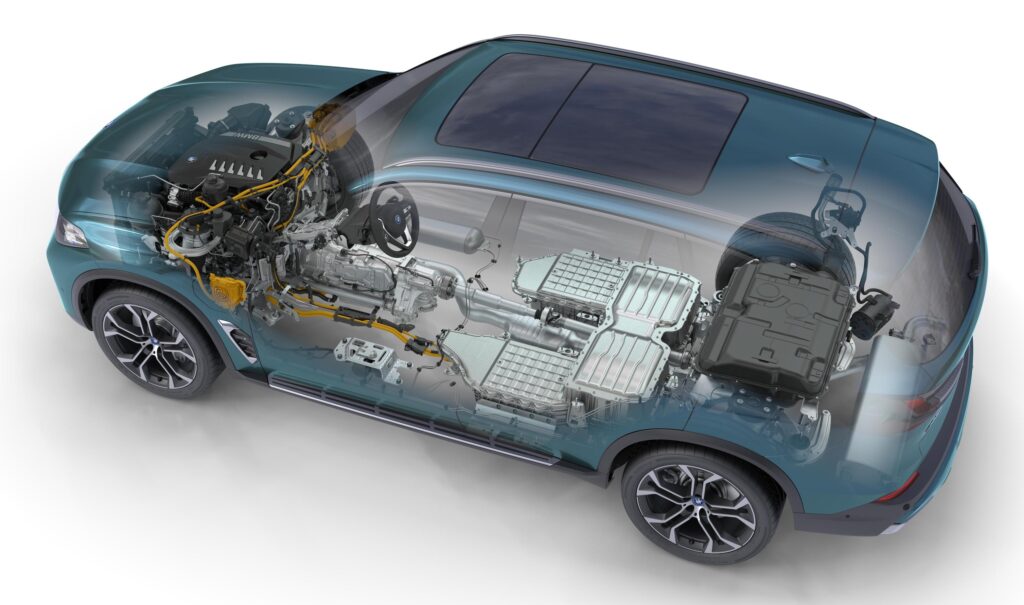An updated drive system line-up has been unveiled by BMW for its latest X5 and X6 models, which can now be optioned with new combustion engines, and a latest-generation plug-in hybrid system for the BMW X5 xDrive50e and a 48V mild-hybrid technology for all other models.
Both models can be ordered with either a V8 petrol, an in-line six-cylinder petrol, or an in-line six-cylinder diesel engine, each from BMW’s latest generation of power units. Mated to the engines is the OEM’s new 8-speed Steptronic Sport transmission which delivers power to the wheels through the BMW xDrive intelligent all-wheel-drive system.
All the models’ drive units now benefit from 48V mild-hybrid technology, consisting of an electric motor integrated into the transmission. This motor generates an output boost of up to 9kW and 200Nm of torque, enabling a high level of efficiency. Additionally, at low speeds, the mild-hybrid system can be used to enable all-electric driving in the BMW X5 xDrive40i and BMW X6 xDrive40i models.
Energy required for the electric power boost is stored in a 48V battery which is located in the engine bay. This is charged efficiently during overrun and braking phases through the use of adaptive recuperation. This regenerated energy is also fed into the vehicle’s electrical system.
The drive system for the plug-in hybrid variant of the X5 has also undergone a host of revisions, with the updated model now labelled the BMW X5 xDrive50e. Installed is an in-line six-cylinder petrol engine combined with a new electric motor to provide an output of 360kW/497ps – an increase of 70kW over the outgoing model – and 700nm.
The compact electric motor integrated into the 8-speed transmission produces 145kW alone. A pre-gearing stage is used to increase the effective torque produced by the electric motor to a peak output of 450Nm at the transmission input for the motor. This provides a sharper power delivery, and results in the X5 xDrive50e achieving 0-100km/h in 4.8 seconds.
Useable energy stored in the high-voltage battery in the model’s undercarriage has also been increase by 25% compared to the previous iteration, to 25.7kWh. A new Combined Charging Unit also doubles the maximum AC charging rate to 7.4kW. A total electric range of 94-110km can be achieved by the BMW X5 xDrive50e in the WLTP cycle.
The new 4.4-liter V8 petrol engine benefits from M TwinPower Turbo technology, derived from powertrains used within BMW M’s high-performance models. M TwinPower Turbo technology and a cross-bank exhaust manifold enable a peak engine power output of 538ps and peak torque of 750Nm. The drivetrain enables the X5 M60i xDrive and X6 M60i xDrive to complete 0 to 100km/h in 4.3 seconds.
For the latest-generation 3.0-liter in-line six-cylinder petrol engine, BMW carried out a host of revisions which changed the powertrain’s combustion process, gas exchange, valve control, injection and ignition system. The engines within the new BMW X5 xDrive40i and new BMW X6 xDrive40i now produce 385ps and a torque output of 520Nm. By using the boost function, 540Nm can be delivered with the help of the mild-hybrid system.
BMW’s in-line six-cylinder diesel engine has also undergone a multitude of design changes, with the 3.0-liter unit now using steel pistons instead of aluminum, an optimized oil separation process and a new common-rail direct injection system with solenoid valve injectors. The BMW X5 xDrive30d and new BMW X6 xDrive30d’s engine, combined with the mild-hybrid system, produces a maximum output of 302ps and a peak torque of 670Nm.



